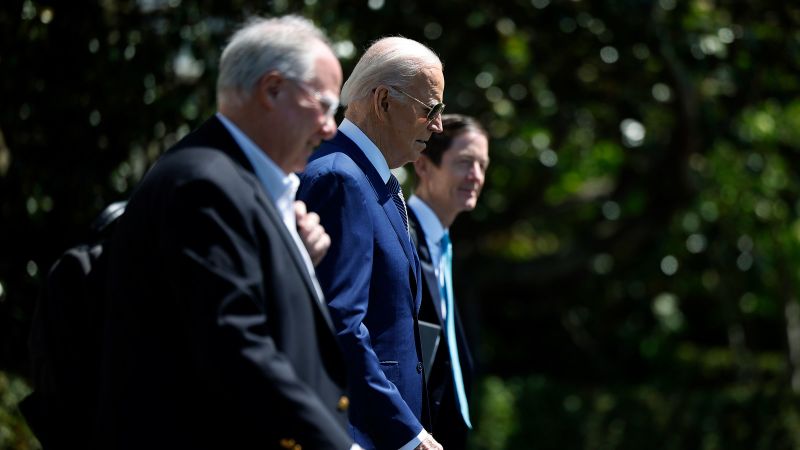In a revealing new book titled “Original Sin: President Biden’s Decline, Its Cover-Up, and His Disastrous Choice to Run Again,” authors Jake Tapper of CNN and Alex Thompson from Axios detail troubling aspects of President Biden’s final years in office. Drawing from over 200 interviews with Democratic insiders conducted primarily after the 2024 election, the authors illustrate a president grappling with significant cognitive and physical challenges. Notably, Biden experienced episodes of forgetfulness regarding the names of his close aides, a dwindling public schedule, moments of incoherence during discussions, and a concerted effort by his team to manage the public’s perception of his mental decline.
During this period, many democratic stakeholders, including lawmakers and advisors, noted Biden’s deteriorating capabilities. Despite their concerns, there was a unanimous reluctance to voice dissent or to derail his ambitions for a 2024 reelection campaign. The authors highlight that a prominent debate performance in mid-2024 was symptomatic of a larger pattern, reflecting the stark realities of an aging president whose cognitive powers had been in steady decline.
The book suggests that the motivation behind re-running was twofold: self-interest and a fear of re-electing Donald Trump. The authors contend that Biden’s family and team ignored the burgeoning evidence of his declining faculties in favor of an aspiration to stave off a Trump return to the presidency. The urgency of Biden’s situation was underscored with sad news announced from the White House regarding a newly-diagnosed aggressive form of prostate cancer that had metastasized to his bones, further complicating the discourse around his viability as a candidate.
Bipartisan expressions of concern flooded in following the cancer announcement, with even former President Trump extending well wishes for a speedy recovery. Yet in the realm of politics, questions remained about the appropriateness of Biden’s bid for reelection. Vice President JD Vance conveyed that while they wish Biden well, it is crucial to candidly evaluate his fitness for office. Democratic insiders echoed similar sentiments, noting the frustration with Biden’s inner circle that often shielded him from the unvarnished realities needed for critical decision-making.
The scrutiny over Biden’s abilities was not limited to the political sidelines. In a private setting, Biden struggled to recognize key figures from his political past, such as National Security Adviser Jake Sullivan and Hollywood star George Clooney. This alarming decline prompted discussions among aides about the president’s reliability in crisis situations.
Publicly, the narrative was becoming increasingly precarious. Biden’s supporters were concerned over the president’s noticeable deterioration and his inability to connect during crucial public engagements. Internal sources expressed worry over Biden’s fitness, questioning if he could effectively perform under pressure, especially during late-night emergencies.
Internal dynamics also came under scrutiny, as the authors painted a picture of a “Politburo,” a protective, insular group surrounding Biden. This group prioritized loyalty over transparency and felt that shielding the president from uncomfortable truths was essential. Consequently, other aides, pollsters, and even members of Biden’s political team felt sidelined from making decisions that could impact the president’s political future.
These dynamics were further tested during Biden’s performance at a pivotal State of the Union address, where he seemed less engaged in subsequent interactions. Some staff described a dissonance between his energizing speech and later displays of cognitive struggle, further intensifying concerns. Biden’s healthcare decisions and how they might affect his job performance were echoed amid reports claiming that the president’s health issues originated as far back as 2020.
The political narrative crescendoed amid increasing pressures for Biden to step aside, spurred by visible shortcomings showcased during various engagements. The authors share anecdotes concerning prominent Democrats urging Biden’s team to facilitate more unscripted interactions to showcase his abilities, highlighting the stark contrast with the president’s actual capabilities. Encounters with aides during discussions left some feeling alarmed, pointing to a stark reality: the intersection of political ambition and the president’s declining health presented a precarious challenge not only for Biden but for the entire Democratic party’s future.
Ultimately, the internal conversations surrounding Biden reached a critical juncture as high-ranking Democrats began advocating for his withdrawal from the 2024 race. Senator Chuck Schumer’s candid discussion with the president illustrated concerns about Biden’s legacy, with the senator confronting Biden about his dwindling electoral support and insisting that a secret ballot would yield overwhelmingly disapproval among Senate Democrats regarding his candidacy.
Biden’s candidacy in 2024, against a backdrop of cognitive decline and health deteriorations, illuminates the complexities of leadership during the twilight years of a political career. The interconnected narrative of Biden’s waning abilities and the dynamics within his administration encapsulates a critical period in American political history, as stakeholders grapple with the implications of his decision to pursue reelection.



